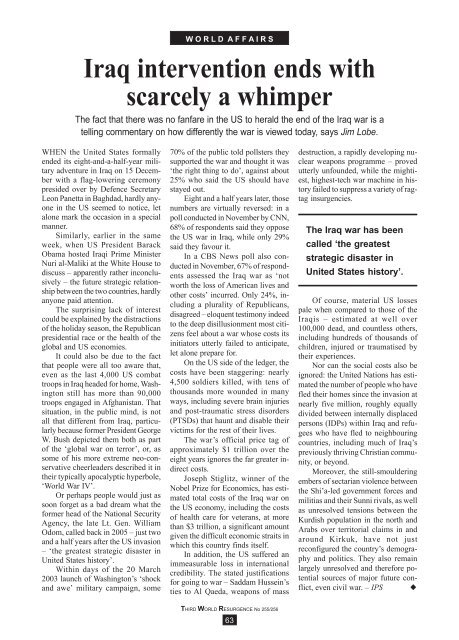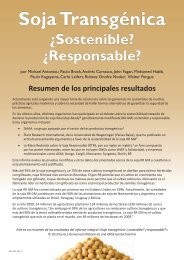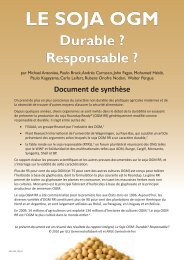Download - Third World Network
Download - Third World Network
Download - Third World Network
You also want an ePaper? Increase the reach of your titles
YUMPU automatically turns print PDFs into web optimized ePapers that Google loves.
W O R L D A F F A I R SIraq intervention ends withscarcely a whimperThe fact that there was no fanfare in the US to herald the end of the Iraq war is atelling commentary on how differently the war is viewed today, says Jim Lobe.WHEN the United States formallyended its eight-and-a-half-year militaryadventure in Iraq on 15 Decemberwith a flag-lowering ceremonypresided over by Defence SecretaryLeon Panetta in Baghdad, hardly anyonein the US seemed to notice, letalone mark the occasion in a specialmanner.Similarly, earlier in the sameweek, when US President BarackObama hosted Iraqi Prime MinisterNuri al-Maliki at the White House todiscuss – apparently rather inconclusively– the future strategic relationshipbetween the two countries, hardlyanyone paid attention.The surprising lack of interestcould be explained by the distractionsof the holiday season, the Republicanpresidential race or the health of theglobal and US economies.It could also be due to the factthat people were all too aware that,even as the last 4,000 US combattroops in Iraq headed for home, Washingtonstill has more than 90,000troops engaged in Afghanistan. Thatsituation, in the public mind, is notall that different from Iraq, particularlybecause former President GeorgeW. Bush depicted them both as partof the ‘global war on terror’, or, assome of his more extreme neo-conservativecheerleaders described it intheir typically apocalyptic hyperbole,‘<strong>World</strong> War IV’.Or perhaps people would just assoon forget as a bad dream what theformer head of the National SecurityAgency, the late Lt. Gen. WilliamOdom, called back in 2005 – just twoand a half years after the US invasion– ‘the greatest strategic disaster inUnited States history’.Within days of the 20 March2003 launch of Washington’s ‘shockand awe’ military campaign, some70% of the public told pollsters theysupported the war and thought it was‘the right thing to do’, against about25% who said the US should havestayed out.Eight and a half years later, thosenumbers are virtually reversed: in apoll conducted in November by CNN,68% of respondents said they opposethe US war in Iraq, while only 29%said they favour it.In a CBS News poll also conductedin November, 67% of respondentsassessed the Iraq war as ‘notworth the loss of American lives andother costs’ incurred. Only 24%, includinga plurality of Republicans,disagreed – eloquent testimony indeedto the deep disillusionment most citizensfeel about a war whose costs itsinitiators utterly failed to anticipate,let alone prepare for.On the US side of the ledger, thecosts have been staggering: nearly4,500 soldiers killed, with tens ofthousands more wounded in manyways, including severe brain injuriesand post-traumatic stress disorders(PTSDs) that haunt and disable theirvictims for the rest of their lives.The war’s official price tag ofapproximately $1 trillion over theeight years ignores the far greater indirectcosts.Joseph Stiglitz, winner of theNobel Prize for Economics, has estimatedtotal costs of the Iraq war onthe US economy, including the costsof health care for veterans, at morethan $3 trillion, a significant amountgiven the difficult economic straits inwhich this country finds itself.In addition, the US suffered animmeasurable loss in internationalcredibility. The stated justificationsfor going to war – Saddam Hussein’sties to Al Qaeda, weapons of massdestruction, a rapidly developing nuclearweapons programme – provedutterly unfounded, while the mightiest,highest-tech war machine in historyfailed to suppress a variety of ragtaginsurgencies.The Iraq war has beencalled ‘the greateststrategic disaster inUnited States history’.Of course, material US lossespale when compared to those of theIraqis – estimated at well over100,000 dead, and countless others,including hundreds of thousands ofchildren, injured or traumatised bytheir experiences.Nor can the social costs also beignored: the United Nations has estimatedthe number of people who havefled their homes since the invasion atnearly five million, roughly equallydivided between internally displacedpersons (IDPs) within Iraq and refugeeswho have fled to neighbouringcountries, including much of Iraq’spreviously thriving Christian community,or beyond.Moreover, the still-smoulderingembers of sectarian violence betweenthe Shi’a-led government forces andmilitias and their Sunni rivals, as wellas unresolved tensions between theKurdish population in the north andArabs over territorial claims in andaround Kirkuk, have not justreconfigured the country’s demographyand politics. They also remainlargely unresolved and therefore potentialsources of major future conflict,even civil war. – IPS ÿuTHIRD WORLD RESURGENCE No 255/25663















